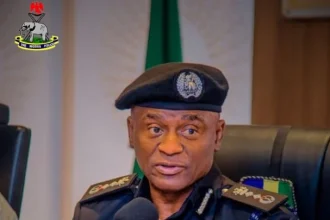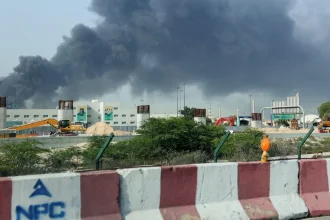The Ogere axis of the Lagos-Ibadan Expressway will be temporarily closed on Thursday, following a tanker fire incident that occurred there on Wednesday, the Federal Road Saftey Corps has announced.
Traffic through the axis would be diverted while FRSC operatives will continue managing traffic situation till there till Friday when the highly inflammable content remaining in the tanker will be moved.
The FRSC made the announcement in a statement signed by The corps’ Public Education officer Ogun State Sector Command, Route Commander Florence Okpe, on behalf of the Ogun State Sector Commander.
A tanker laden with 33,000 litres of premium motor spirit, popularly known as petrol, fell and caught fire on Wednesday close to Kwakyama fuel station along the area, killing the three occupants of the tanker. The resulting fire led to gridlock on the road forcing the diversion of the traffic to the other lane.
READ ALSO: Fire outbreak as tanker, commercial bus crash on Lagos-Ibadan Expressway
Okpe said in the statement, “The PTD NUPENG after due consultation with the FRSC and diligent assessment of the automobile fire the trandloading has been suspended to prevent outbreak of any further fire explosion,
The Ops has been temporarily suspended for transloading to resume tomorrow morning Thursday 19 October 2017.
“The Lagos Ibadan expressway at the affected portion around Ogere will remain temporarily closed as traffic is diverted at the scene of the incident, while FRSC operatives will continue managing traffic situation till tomorrow when the product will be transloaded.”
In view of the envisaged traffic gridlock, the FRSC said it will divert traffic at the Sagamu interchange for motorists travelling from Lagos to connect Lagos-Ibadan Old Road through Police Area command, while at KM 27 Ibadan-Lagos Expressway the FRSC will equally divert traffic to Old Ibadan-Lagos.
“This will remain till transloading is completed and the burnt tanker is completely removed from the road and safety guaranteed,” Okpe added. “Motorists are enjoined to drive cautiously and cooperate with FRSC officials and other traffic and emergency agencies throughout the operation.”











